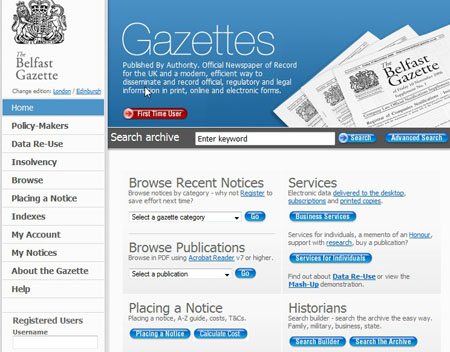What You Need to Know:
• Southern Ireland (predominantly Catholic) became known as the Republic of Ireland and formed a separate nation from the United Kingdom. It kept its own government records.
• Northern Ireland (predominantly Protestant) still remained part of the United Kingdom and for the most part maintained the English record keeping system.
• The main repository for genealogy records for Northern Ireland is the Public Records Office of Northern Ireland (PRONI). PRONI has a well laid out website that is continually adding more genealogy records online. Access is free. [Northern Ireland Genealogy Records]. Another very useful genealogy website for Northern Ireland is the Belfast Gazette. This is the official newspaper of record for the government in Northern Ireland. It is full of historical announcements, many of which relate to individuals. Access is free. [Belfast Gazette]. Both these sites can be searched at the same time using the free Genealogy Search Engine.

• Other key government sites for the Republic of Ireland are the National Archives and the government's Irish Genealogy website. Both are free. [Ireland National Archives] [Irish Genealogy] These sites (as well as several other Irish sites) can all be searched at one time using the free Genealogy Search Engine.
What You Need to Know:
• Prior to 1926 there was no such thing as a legal adoption in England. The term adoption before 1926 referred to guardianship or foster parenting. After 1926 the government legalized the process of adoption.
• It is estimated that currently labout 0.7% of live births of all children in England and Wales are adopted. This number was almost certainly higher in the past.
• Adoptions were traditionally arranged through an adoption society, a local council, a lawyer, a doctor or a friend.
• Prior to 1926, voluntary organizations and municipal authorities may have adoption records. However, these records were often only kept for a few years and then destroyed. Adoption agencies normally kept records for 25 years, but often the records lacked sufficient details to be of much use.
• In general, the farther back in time you go looking for adoption records, the less likely it is that you will find anything of value.
What You Need to Know:
• You require special permission to obtain certified copies of still births, but they are available. In general, only a mother or father can apply for a stillbirth certificate. If they are both deceased then a brother or sister can apply. The ordering restrictions are descibed on the DirectGov website. [Ordering English Stillbirth Certificates]

